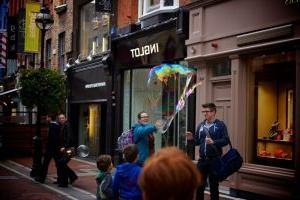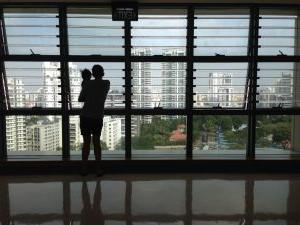Family-Friendly Cities?
对城市中心的重新关注和发展引起了社会科学家的兴趣, economists and urban thinkers (among others), catalyzing a range of discussions. Among the most interesting in recent months has been The American Conservative关于“充满活力”的邻里、孩子和社区的辩论. In a withering critique of the creative class and it’s vibrant urban neighbourhoods (VUNs), 本杰明·施瓦茨将简·雅各布斯的格林威治村的多样性和活力与今天存在的形式进行了对比. 认为今天的vun正在变成“成人游乐场”, 他指出,雅各布斯简洁地指出了不同城市和地区的商业潜力, 她看到社区的主要目的是促进家庭和社区的发展. 他们认为,全球资本主义的灾难性资金和“一个流动的中产阶级”的崛起,使当代的VUNs变得乏味,而不是充满活力, 施瓦茨认为,过去的vun已经不复存在,无法复制.

孩子们生活在“充满活力的城市社区”——越来越罕见的景象?
Countering Schwarz, 艾米丽·华盛顿(Emily Washington)指出,四口之家的收入几乎是单身家庭的三倍, and thus, in many cities, 有足够的经济实力来选择他们所选择的社区吗. In her view在美国,缺乏好的城市公立学校是家庭迁往郊区的主要原因. 反过来,这表明教育政策可以在留住家庭方面发挥重要作用. Building on this, urban planner and downtown dad Bradley Calvert, notes that as millennials begin to have families, 他们会寻找许多与前几代父母相同的东西. To retain this demographic and sustain the renewal of cities, he urges a range of policy measures, including good schools, the development of the “missing middle的密度,以及向市场宣传这座城市对家庭来说安全高效的努力.

容纳、吸引和留住家庭对于维持最近的城市复兴至关重要
The 城市的长期成功将取决于其容纳各种人口和人口结构的能力. And as Enrique Penalosa sagely puts it “Children are a kind of indicator species. 如果我们能为孩子们建设一个成功的城市,我们就会有一个为所有人建设的成功的城市.“因此,采取进一步措施吸引和留住家庭至关重要. Schwarz’s critique of today’s VUNs has merit, 但是,对单一社区类型和一系列流行语的狭隘关注限制了他结论的相关性, which are based on an otherwise strong analysis. 华盛顿和卡尔弗特更广泛的建议为建设家庭友好型城市提供了许多途径. T没有单一的解决方案来吸引和留住城市核心的家庭, 但好的学校和一系列的住房选择是人生阶段多样性的重要组成部分. The widespread appeal of the city among 年轻人一直是城市重新焕发活力、提高城市在各类人群中的吸引力的关键. As this interest plateaus, politicians, 规划者和开发商最好不要把眼光放在这些光鲜快乐的人身上, towards mom, dad and the grandparents, if urban vitality is to become a long-term trend.







